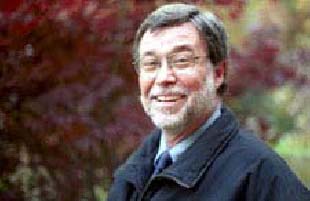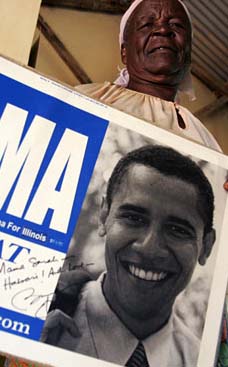
"Rice plantation owners would pay extra for slaves from Sierra Leone and other West African nations in the area known as the 'Rice Coast' because these people knew how to cultivate rice," Opala said. "It was this connection that would later prove crucial in my research, leading to a direct familial connection between the Gullah community in South Carolina and Sierra Leone." Opala said that approximately 35,000 Sierra Leone natives were shipped as slaves from Bunce Island, which lies in the harbor where Freetown, the nation's capital, is located. "Many people have asked me why people from that area would sell fellow Africans into slavery," Opala said. "The answer would cover another lecture that would be at least as long as the one I'm giving here. Suffice to say Africans during that period were divided along tribal lines and did not see themselves in a collective pan-African identity." Anthropologist Joseph Opala served as a Peace Corps Volunteer in Sierra Leone.
Historian Joseph Opala Connects African Nation to Gullah Community Through a Slave Girl Named Priscilla
Sierra Leone: A World Away: Historian Connects African Nation to Gullah Community Through a Slave Girl Named Priscilla
Phil Sarata
20 November 2008
Freetown — Still in a celebratory mood over the election of America's first black president, students and guests at South Carolina State University's I.P. Stanback Museum and Planetarium on Thursday evening were made privy to the compelling story of one alumna who completed a metaphorical connection to her African origins -- all through a family member brought to the Palmetto State as a slave 250 years ago.
A 17-year resident of the West African nation of Sierra Leone, anthropologist and James Madison University lecturer Joseph Opala presented "Priscilla's Homecoming: A Gullah Woman Finds Her Roots in Sierra Leone" that recounted the result of his field research linking S.C. State graduate Thomalind Martin Polite, a primary school speech therapist in Charleston, as the direct descendent of a 10-year-old girl named Priscilla. The young girl was brought to Charleston on a slave ship in 1756 and sold to a South Carolina rice plantation family.
Opala laid the foundation for his story by talking about a series of events that led him to Bunce Island in 1979, home to a British slave-trading fortress from 1670 to 1807. It was from there that many Sierra Leoneans were sold into slavery by native slave traders.
"It was here that I learned about the South Carolina connection to Bunce Island," Opala said. "On the island is the grave of Thomas Knight, who was the commander of the fortress for over 20 years. The records available from that time show that Knight shipped slaves to Bunce Island's South Carolina agent Henry Laurens, a well-known figure in history and one of the colony's delegates to the Continental Congress.
"Rice plantation owners would pay extra for slaves from Sierra Leone and other West African nations in the area known as the 'Rice Coast' because these people knew how to cultivate rice," Opala said. "It was this connection that would later prove crucial in my research, leading to a direct familial connection between the Gullah community in South Carolina and Sierra Leone."
Opala said that approximately 35,000 Sierra Leone natives were shipped as slaves from Bunce Island, which lies in the harbor where Freetown, the nation's capital, is located.
"Many people have asked me why people from that area would sell fellow Africans into slavery," Opala said. "The answer would cover another lecture that would be at least as long as the one I'm giving here. Suffice to say Africans during that period were divided along tribal lines and did not see themselves in a collective pan-African identity."
In 1988, Sierra Leone President Gen. Joseph Saidu Momo made a visit with Opala to South Carolina after being made aware of the Gullah culture in coastal South Carolina and Georgia. It was during that occasion that Momo was introduced to a gathering in Beaufort by a local Gullah man in the Gullah dialect.
"President Momo was so excited in hearing the similarity of Gullah to his native language that he nearly knocked the man off the podium," Opala laughed. "But what Momo told the audience had several native South Carolina Gullahs in tears because he spoke to them of the language's proud history. These were people who had been told all their lives that Gullah was an inferior language and how it was nothing more than 'pidgin English.'"
That event led to a number of people in the Gullah communities of South Carolina and Georgia traveling back to Sierra Leone in 1989, which included current state Sen. John Matthews. The homecoming was the basis for an SC-ETV special titled "Families Across the Sea."
After learning of the Gullah connection, Opala said many Sierra Leoneans began to press him to discover a direct family connection between the American Gullah community and ancestors in Sierra Leone. Opala's first connection between the American Gullah communities and Sierra Leone was made through the efforts of another academia who had recorded a Gullah woman singing an African song in 1933.
"It was after a lengthy journey of playing the recording of her singing the song in an African language to many people in the Gullah communities that eventually led us to a woman from Georgia who knew the song," Opala said. "She agreed to come back to Sierra Leone and meet with the president in 1997, which made national news."
However, the breakthrough came thanks to a combination of Opala's research with the New York Historical Society and the work of South Carolina author Edward Ball, who wrote "Slaves In The Family," which contained plantation records of the slaves purchased by Ball's rice plantation family.
"Edward's family had kept voluminous records on its slave purchases," Opala said. "It was here that he discovered one of his ancestors had purchased a 10-year-old girl they named Priscilla. From there, we were able to track the records about Priscilla that led to the identification of her great-great-great-great grandson, Thomas Martin, who was then a principal at a Charleston school.
"The Ball family records were corroborated by the records of the American slave ship Hare out of Rhode Island," he said. "It was the first time I was aware that anyone had been able to match up the plantation records to those of the slave ship and the slave trader."
By the time the last records were finally uncovered, Martin had died. Opala tracked down Martin's daughter, Thomalind Martin Polite, who agreed to travel to Sierra Leone. The 2005 "Priscilla's Homecoming" was a national event in the West African nation and made national news in the U.S. Polite was received by that country's president as a long-lost relative because, as Opala explained, Sierra Leoneans believe that Polite brought back the spirit of the young girl taken away 250 years ago.
"She was a wonderful ambassador for the Gullah community in South Carolina, South Carolina State University and the United States," Opala said. "While she was there, Polite was given an African name and honored with a song especially written and performed for the occasion by the premier singing group in Freetown. She was so moved by the song, whose lyrics included the words 'Go tell the people/Open the gates/Priscilla's come home.'"
Opala's presentation was part of "The Journey Continues" lecture, workshop and performance series associated with the I.P. Stanback Museum's "Journey from Africa to Gullah" exhibition, on display through Jan. 12, 2009. In addition to Matthews, other dignitaries in attendance Thursday were Sierra Leone ambassador to the United States, His Excellency Bockarie Kortu Stevens, Orangeburg state Rep. Jerry Govan and the wife of S.C. State President Dr. George E. Cooper. Also scheduled to appear was Professor Amadu Massally, chairman of the Sierra Leone-Gullah Heritage Association.













